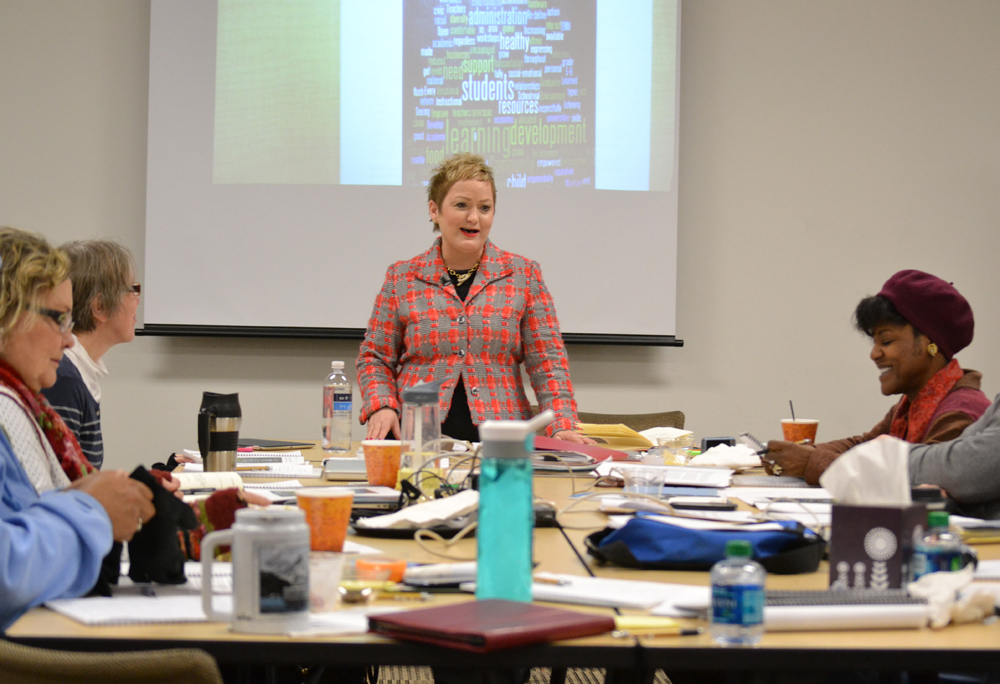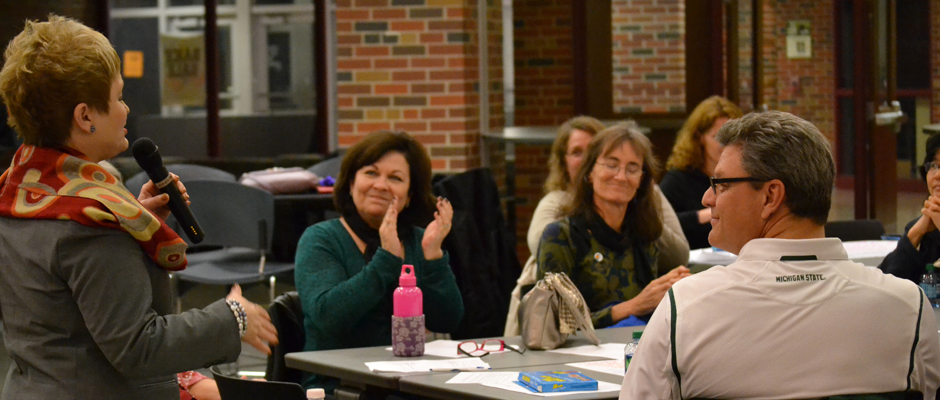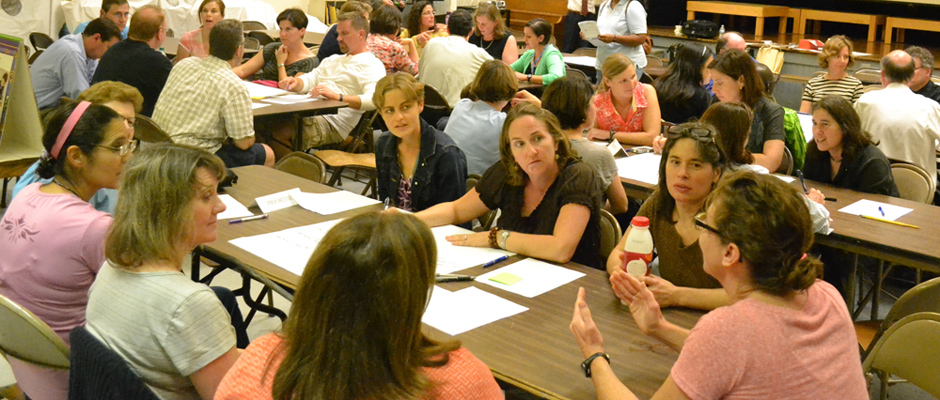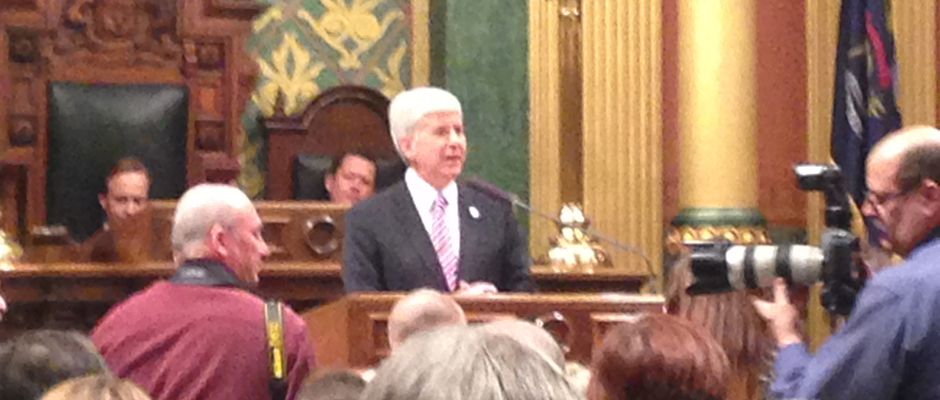
Jan. 22, 2014
By Tara Cavanaugh
The Listen and Learn: We Are Ann Arbor Tour was big. New AAPS Superintendent Dr. Jeanice Swift held over 80 community meetings attended by around 2,000 people.
Those 2,000 people submitted feedback in group notes and discussions as well as individual feedback forms, and a team of University of Michigan researchers analyzed the data in a comprehensive report.
The report will be available on the a2schools.org website and in an informative video by Friday, and Dr. Swift is also sharing the report in public meetings that start next week at the AAPS middle schools.
Dr. Swift also shared the data with the Board of Education at its annual retreat on Jan. 22 at Skyline High School, focusing on the highlights and themes of the Listen and Learn tour.
“Our Ann Arbor student performance stacks up,” Dr. Swift said. “That is certainly a celebration.” Twenty-eight percent of respondents said the district’s high academic standards and achievement was something to celebrate.
“The quality of staff was referenced in every single meeting with community members,” Dr. Swift said. “And in every meeting with high school students they referenced the quality of their teachers.”
Community members focused on two big areas for improvement: funding and student support.
Dr. Swift recently called out inaccuracies in regards to public education funding in Gov. Rick Snyder’s State of the State address, which she attended in Lansing on Jan. 16.
Dr. Swift told the BOE that many of the Listen and Learn attendees were frustrated with decreased per-pupil funding.
Another pattern in the data is perceived inequity in how schools are funded, and many referenced field trips, which are most often raised by school PTOs or in partnership with other organizations.
Dr. Swift also said that student support, especially for students on the margins –– those who may perform exceptionally high or those who may struggle due to a variety of causes –– was another big theme.
Trustee Andy Thomas pointed out that he hears concerns from community members that students in the “middle,” who are passing their classes but not necessarily thriving, may not be getting the extra attention that they need.
Keeping buildings clean and well-kept was another theme under reflection. Dr. Swift proposed Project Sparkle, an extra focus on cleaning buildings in partnership with custodial staff, which is already underway.
Trustee Thomas and BOE President Deb Mexicotte pointed out that it was important to consider those who were unable to attend the Listen and Learn forums. Dr. Swift acknowledged that the data in the report may be limited to those who attended. At some schools, community members spoke up for others who were unable to attend, she said.
Dr. Swift also touched on teacher quality as a concern from the community.
“The Ann Arbor community is reverential of their quality teachers,” Dr. Swift said. “The flip side of that –– I need to be responsible and articulate that because the data is clear. There is no tolerance in this community for underperforming teachers.There is a feeling that … when we’ve allowed underperforming staff members to remain in a position and when , in the public eye, we’ve not taken care of that, the community feels strongly that’s a blemish on the AAPS name and brand and quality.
“They are very clear that the superintendent needs to attend to that.”
Listen and Learn forum attendees were also asked to share their dreams and aspirations for the district.
“One of the dreams I find very reassuring is a strong desire that every neighborhood school be quality and that be the promise we make to our parents,” Dr. Swift said.
“Parents who think about these things have a strong desire that we prepare our children for the world they will face as opposed to preparing them for the world they already face.”
Technology was another big theme under the dream category. “And it isn’t necessarily for more gadgets,” Dr. Swift said. “It’s that when we have it, it is integrated with instruction and teachers are well-qualified to use it. (Attendees) were very clear about not just having technology for technology’s sake.”
Parents were also hopeful that food and nutrition choices are improved and that the district increase partnerships in the community. “We have a lot of partnerships with U-M and the community would like more as well,” Dr. Swift said.
Listen and Learn attendees were asked to label three priorities for Dr. Swift to focus on first. More than 60 percent of responses are about student resource and development and funding, Dr. Swift said.
Preserving neighborhood schools, and creating more pathways to success, including a better developed alternative high school program were also big priorities. “That’s a huge pattern across the district –– making sure that we’re sealing the cracks and not losing students who face challenges,” Dr. Swift said.
When it comes to changes and improvements for the district, Dr. Swift stressed that she wants the board to think of one, three and five-year phases.
“It’s important to me that we think of it in terms of a developmental process. This is not just one shot and done,” she said.
“Listening and learning didn’t just happen between September and December. Ongoing opportunities to interact with the community is a priority, and we’ll be working on structures to have that happen.”
Dr. Swift laid out next steps as a result of the Listen and Learn tour:
1. Creating an Assessment Advisory Board: Parents, community members and staff can join the board, which will examine current assessment practices, understand state requirements and bring forward proposals to the Superintendent to inform an amended Assessment Plan for the 2014-2015 school year. (The application to be on the board can be found here.)
2. Project Sparkle: An extra emphasis on creating clean and well-cared for environments in every school. Custodial staffs are already investing extra time toward Project Sparkle.
3. Share Listen and Learn report, feedback and further analysis: Dr. Swift will be sharing the Listen and Learn report with the community in a variety of ways: meetings in late January and early February, Schoolmessenger emails to AAPS parents, the AAPS website, the AAPS News website, and AAPS social media. The U-M researchers are also diving further into the research and will be creating more reports.
4. Blue Ribbon Advisory Board: Community leaders from the business, nonprofit, higher education and municipal communities will meet from November 2013 to June 2014 and serve as a community-based advisory, a think tank and a sounding board.
5. Infusing of rich programming into buildings with available capacity: Recommendations for Board consideration include:
- A K-8 STEAM campus featuring 1:1 technology located at Northside Elementary
- A Pathways to Success Campus that offers options for alternative students. The campus would co-locate Roberto Clemente, A2 Tech, GED and the Options Program and Adult Education to Stone School location.
- The Virtual+ Academy, featuring a lab classroom in each comprehensive high school, Community and Pathways to Success Campus
- More early childhood education options: a combined Great Start Readiness Program/Tuition model that features preschool classrooms at Allen and Thurston for 2014-2015 and a potential expansion to preschool locations in each cluster for 2015-2016
- Expansion of the Young 5’s Program
- 1:1 Technology Initiatives at Bryant and Pittsfield Elementary K-1 classrooms, at the K-8 STEAM campus, at the Pathways to Success campus, and exploring a Bring-Your-Own-Device policy in one middle school and one high school location
- Expand World Languages to select Elementary Schools: Chinese, Mandarin Chinese, Sign Language, Arabic and Japanese
6. Ensure an open, collaborative, and clearly defined budget process: Create an open and collaborative budgeting process that includes community feedback.
7. Communicate, communicate, communicate: Creating consistent and ongoing communication to the internal and external school system.
Dr. Swift and the Board will discuss these next steps this afternoon. Stay tuned for another AAPS News story about their conversation.
All comments will be approved and moderated. Please see the new AAPS News Commenting Guidelines.




Be the first to comment